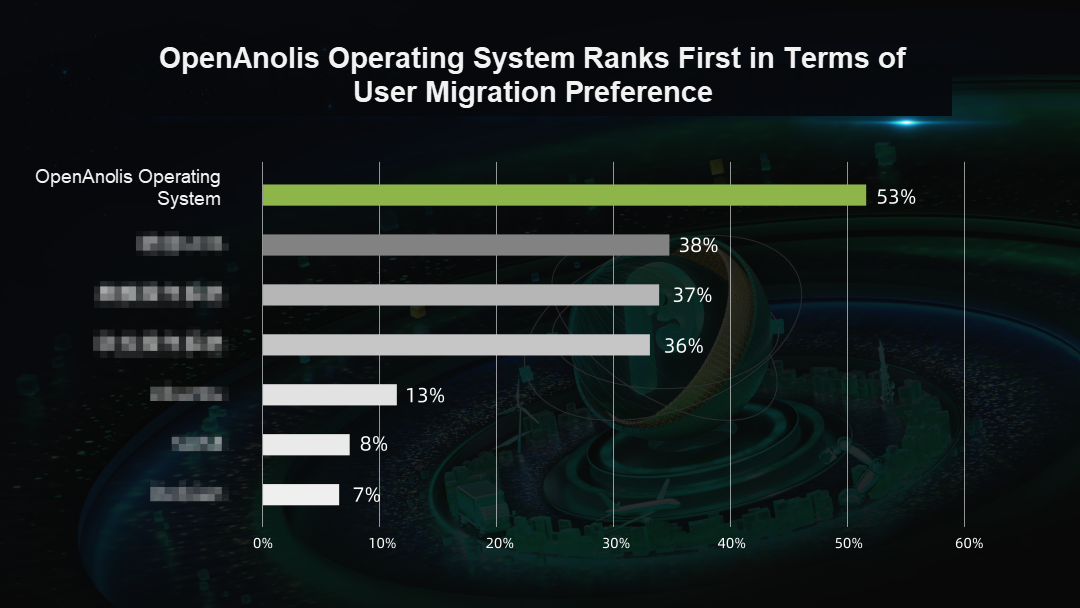This article is a reprint from InfoQ with the full interview below.

In the current IT industry, cloud and AI have become the two recognized core driving forces of industrial upgrading, especially after Generative AI has rapidly swept the entire industry, the concept of integrating cloud computing and AI to stimulate business innovation has quickly been acknowledged. As the key software of the underlying infrastructure of cloud and AI, the server operating system plays an important role in this transformation. Cloud service vendors and AI application developers have put forward many new requirements for server operating systems, which promote the continuous advancement of operating system technology, gradually ushering the entire industry into the 2.0 era.
The China's domestic server operating system community has been developing rapidly in recent years. As the trend of cloud intelligence integration transformation leads the iteration of server operating systems, how should our community respond? How to seize the opportunity, solve the challenges, and break the entrenched cognition of users, so as to rise fast and build the software infrastructure platform required by the industry in the era of cloud intelligence integration?
At the first OpenAnolis conference held recently, InfoQ interviewed Pengcheng Zhang, the Product Director of Alibaba Cloud Basic Software Department, and Zhenghua Jia, an expert of the Alibaba Cloud operating system team. The two guests discussed how Alibaba Cloud and OpenAnolis should seize the opportunity of cloud intelligence integration, and what long-term plans will be made in the future.
Since 2009, Alibaba Cloud has begun to develop its own server operating system for internal business. After years of research and practice, Alibaba Cloud's internal operating system has gradually matured, and demand for this operating system by cloud users arises. Therefore, Alibaba Cloud made it officially open source to Alibaba Cloud users in 2017. This is Alibaba Cloud Linux (or ALinux for short).
Faced with the general trend of domesticized ecological development, Alibaba Cloud and several members jointly built the OpenAnolis community in 2020, which played a crucial role during the CentOS suspension. According to a survey conducted by the China Academy of Information and Communications Technology, the OpenAnolis operating system ranks first in terms of user migration preference, with the proportion exceeding half at 53%.
Alibaba Cloud invested extensive technology and experience gained from the ALinux operating system into the OpenAnolis community when it was in the early stages. As a result, the OpenAnolis community released its first-generation operating system, called Anolis OS, in early 2021. Anolis OS is a new operating system that meets the needs of diverse scenarios. It provides a basic platform for community members and satisfies the demand for cloud intelligence integration. In contrast, ALinux aims to serve Alibaba Cloud and Alibaba Cloud users with the advantage of software and hardware co-design and service capabilities. Anolis OS is the carrier of open source projects in the OpenAnolis community and carries the incubation task of diversified technological innovations in the community.

ALinux and Anolis OS mutually learn and progress together. Many of the mature technical innovations of ALinux, proven through practical tests, are contributed to the OpenAnolis community through Alibaba Cloud, while various improvements and functions made by members of the OpenAnolis community for Anolis OS are also absorbed by ALinux to infuse new vitality.
The relationship between ALinux and the OpenAnolis community/Anolis OS represents a typical development path of China's domestic server operating systems: manufacturers with strong technical strength develop high-level operating systems in their own practices and make them open source. Then, these manufacturers can take the lead in launching new system ecological communities and inject the mature technology of their own systems into the community to form a driving force, attracting and aggregating industrial forces to jointly invest in open source projects of the community, thus promoting the prosperity of the community.
The advantage of this path is that manufacturers like Alibaba Cloud have gained extensive production experience from past practices, especially in the Double 11 promotion in Taobao, which has ultra-large traffic. Having stood up to these tests, Alibaba Cloud systems meet extremely high requirements for O&M stability, reliability, and security. When these high-level technological achievements are exported to the newly established open source server operating system community, the latter is provided with a high starting point. This greatly reduces the early development cycle of the new product ecosystem and makes it easier to attract leaders in different fields to join the community and make contributions.
Thanks to the sufficient technology reserves from the output of ALinux, Anolis OS is capable of meeting the challenges of operating system transformation in a short time. With the integration of cloud computing and AI approaching, the OpenAnolis community has begun to strategize and strive to make Anolis OS a pioneer in leading the transformation.
In the early days of cloud computing, enterprises that began providing public internet services naturally turned to cloud services, sparking the first wave of the cloud computing industry, mainly driven by internet enterprises. As cloud computing matured, traditional enterprises pursued information technology upgrades, triggering the second wave of the industry. Today, the rapid development of Generative AI is ushering in the industry's third major leap.
Server operating systems have historically provided underlying hardware capabilities and supported more software and business ecosystems during the development of cloud computing. With the rise of Generative AI, server operating systems are now required to better support upward AI applications and effectively utilize ultra-large-scale computing power to provide resources for AI. They are also expected to assist developers and users in leveraging cloud AI capabilities.
However, the immense demand for computing resources and the fast-growing needs of Generative AI technology pose an unprecedented challenge for server operating systems. They must effectively manage both general and heterogeneous computing while adapting to the rapid growth and varied development of computing power resources. In addition, the substantial data requirements of Generative AI, combined with large-scale computing power, demand exceptionally high levels of security and stability from the operating system.
In this context, the OpenAnolis community holds a significant innate advantage.
Anolis OS, deriving its foundation from ALinux, benefits from the extensive experience and ultra-large-scale cloud services of Alibaba Cloud, making it naturally equipped to meet the challenges of ultra-large-scale computing resources. It is proficient in software optimization, as well as in ensuring security and stability. Furthermore, ALinux is presently creating AI-optimized container images to offer users a ready-to-use AI operating environment, addressing ecological compatibility issues and performance optimization demands in the AI scenario.
At the core of the OpenAnolis community, governing units and community members have contributed numerous core technologies to Anolis OS, enabling it to effectively integrate a wide range of AI software stack capabilities from the outset. This positions Anolis OS as one of the most adaptable system brands to the cloud intelligence integration transformation in the server operating system field. The OpenAnolis community is leveraging excellent technological achievements from various industries to enhance the ecosystem's overall level and promote domestic systems to become global leaders.
The fair, open, and inclusive community atmosphere is essential for the healthy development of the OpenAnolis community, which also outlines a blueprint for future long-term development.
Looking ahead, the community will continually adhere to three major directions. First, it will address the supply chain security of China's domestic server operating systems, fortifying the system's supply chain and enhancing the robustness of the community ecosystem. Second, the community will intensify the research and implementation of independently developed technologies, facilitating technological substitution. Lastly, it will leverage the opportunities brought by cloud intelligence integration to help users establish differentiated competitiveness based on innovative technology developed through cloud intelligence integration.
The internationalization efforts of the OpenAnolis community are ongoing. The community treats domestic and foreign partners and community members equally and actively participates in the technological evolution of international upstream communities to secure a more influential role.
Despite being established for a few years, the OpenAnolis community has attracted a wide range of users and established a relatively mature ecosystem. The community developer group has experienced a growth rate of up to 110%, demonstrating exceptional innovation and activity within China. Additionally, the community has established nearly 60 special interest groups and handles an average of over 5,000 requests per month. Every two years, the community releases a community version, while derivative versions from its partners serve over 800,000 users.
Presently, the OpenAnolis community is on the fast track of development and is poised to benefit from the cloud intelligence integration. Its success serves as a model for the development of other China's domestic server operating systems, proving that, despite a delayed start, the domestic system can rapidly catch up by fostering an ecosystem characterized by openness, fairness, and collaborative cooperation. As the server operating system enters its 2.0 era, we anticipate witnessing domestic brands compete on par with top international brands, providing a strong platform for the cloud intelligence integration and industrial upgrading of numerous industries.
AI Software Stack-Oriented Optimized Design - AI Ecosystem Construction in OpenAnolis

96 posts | 6 followers
FollowAlibaba Clouder - October 26, 2020
OpenAnolis - July 8, 2022
OpenAnolis - December 8, 2022
Alibaba Clouder - July 23, 2021
Alibaba Clouder - November 10, 2020
Alibaba Clouder - June 24, 2020

96 posts | 6 followers
Follow Alibaba Cloud Linux
Alibaba Cloud Linux
Alibaba Cloud Linux is a free-to-use, native operating system that provides a stable, reliable, and high-performance environment for your applications.
Learn More Big Data Consulting for Data Technology Solution
Big Data Consulting for Data Technology Solution
Alibaba Cloud provides big data consulting services to help enterprises leverage advanced data technology.
Learn More Function Compute
Function Compute
Alibaba Cloud Function Compute is a fully-managed event-driven compute service. It allows you to focus on writing and uploading code without the need to manage infrastructure such as servers.
Learn More ChatAPP
ChatAPP
Reach global users more accurately and efficiently via IM Channel
Learn MoreMore Posts by OpenAnolis